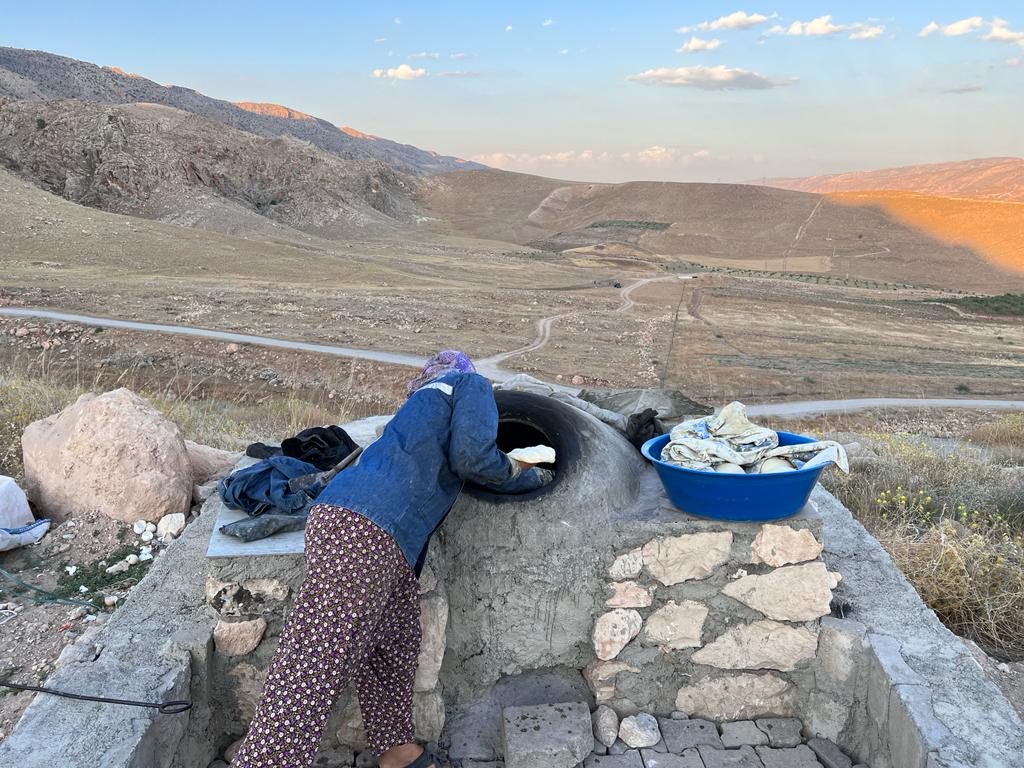We are happy to invite you to a talk by Pelin Tan, Önder Özengi, and Marwa Arsanios.
Date: July 16 at 7:30PM
Location: Ashkal Alwan Space: https://maps.app.goo.gl/f4ow8uAxRskJ3wSn9
Looking forward to seeing you!
Collective learning and the creation of decolonial methodologies against slow violence, extraction, and forced eviction/migration led to pedagogies of the commons. Navigating through migrating ingredients, refugee seeds, and exiled foods, we witness and learn about extractive strategies, state-making, and slow violence. The non-extractivist practices in dispossessed and cohabited landscapes are about “survival-with” and “through” foraging, composting, preserving, landscaping, the comradeship of ingredients, and the germination of resilience, which propose to create together a relational phenomenology.
What can artistic experiences reveal and how can they embody the voice of apocalyptic landscapes? A zone of extraction along the Upper Tigris River and its bordering lands will be examined to foster proposals of artistic research and its methodologies. The Tigris probes questions that build toward broader problematics, inviting participants to engage with artifacts as traces of an apocalyptic era; lands as layers of violence; cycles as Earth’s navigation; and exile as a voluntary collectivity. "Survival-with and through” is something of an entangled kinship that can be described as migrating ingredients, refugee seeds, exiled foods, and communal land.
In her presentation, Pelin Tan will go through her socially-engaged research and actions along the region of Batman, Hasankeyf, and Mardin about collective initiatives of solidarities, women cooperativism, alternative pedagogies, de/archiving as decolonial practices. Artist Marwa Arsanios and curator/anthropologist Önder Özengi will participate as discussants in widening the theme of the cases and methods.
Prof.Dr. Pelin Tan, (Sociologist / Art Historian) based in Mardin and Tire. Roemer Fellow Orient-Institut Beirut. Visiting researcher Dept. of Sociology, Anthropology and Media Studies, AUB 2024. Tan is the 6th recipient of Keith Haring Art&Activism (2019, New York). Senior researcher at the Center for Design, Arts and Social Research (Boston). Head of the Film Dept., Fine Arts Faculty, University of Batman, Turkiye. Her current short documentary “Landscapes as Archives” is about the production of architecture in Palestine supported by the Qattan Foundation, Ramallah (2023). With Vidokle she produced “The Fall of Artists’ Republic'' in Tripoli/Lebanon (Montreal Biennale, 2014 - Istanbul Biennale, 2015). "Gılgamesh: She, Who Saw the Deep - Gilgamêş: Ewe ku kûrahî dît" (2022) supported by Sharjah Film Platform. Tan is the editor of I press publication Cambridge. Her forthcoming book: “Forms of Non-Belonging” E-flux books.
Önder Özengi is a curator, researcher, and lecturer based in Vienna. He studied Anthropology and Art Management. He wrote his MA thesis on institutional critique and alternative institutional practices. He is currently a PhD candidate at The Academy of Fine Arts Vienna and focuses on "Commodification and Appropriation of Artistic Labor." Önder Özengi has curated various exhibitions, including "Relative Position and Conclusions," Suriye Arcade, Istanbul, 2009; "There is Nothing to Lose," Stærekassen, Copenhagen, 2010; "Never Again" Depo, Istanbul, 2013. He writes critical reviews for various magazines, exhibition catalogs, and books. He edited two books titled "Relative Positions and Conclusions" Istanbul: 2011 and "Never Again" (with Asena Günal), Istanbul; İletişim, 2013.
Marwa Arsanios’ practice tackles structural questions using different devices, forms and strategies. From architectural spaces, their transformation and adaptability throughout conflict, to artist-run spaces and temporary conventions between feminist communes and cooperatives, the practice tends to make space within and parallel to existing art structures allowing experimentation with different kinds of politics. Film becomes another form and a space for connecting struggles in the way images refer to each other.
In the past four years Arsanios has been attempting to think about these questions from a new materialist and a historical materialist perspective with different feminist movements that are struggling for their land. She tries to look at questions of property, law, economy and ecology from specific plots of land. The main protagonists become these lands and the people who work them. Her research includes many disciplines and is deployed in numerous collective methodologies and collaborative projects. She is currently finishing her PhD at the Akademie der bildenden Künste in Vienna.









